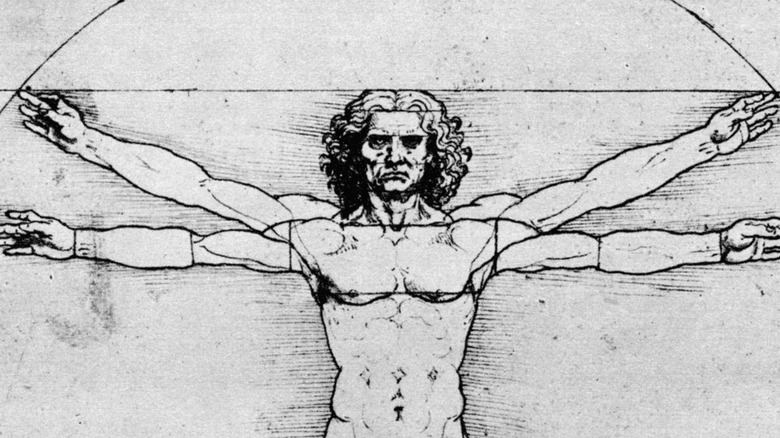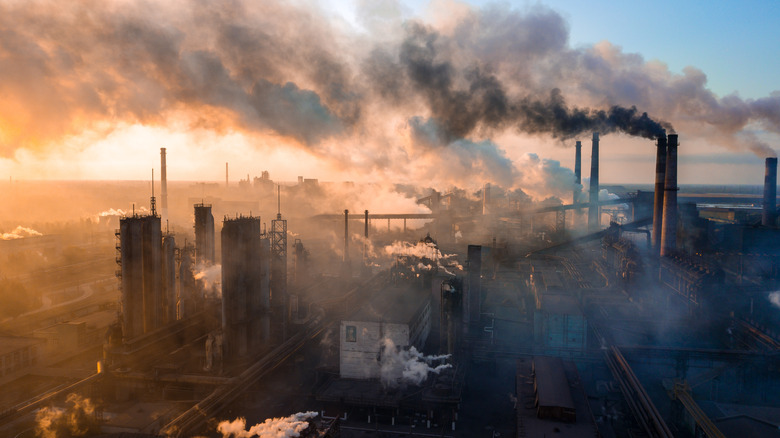What Would Happen If Humans Could Fly?
It's a bird, it's a plane, it's a ... fully-grown, adult human with a near 30-foot wingspan (via The What If Show)? We're not talking about a certain resident of Metropolis who isn't the biggest fan of Kryptonite. We're also not talking about angels, mythological deities, or even people with jet packs or hoverboards (true hoverboards, not those electric sideways skateboards bound to land by the constraints of wheels). In this story, we'll be exploring what it would actually take to get humans in the air, sans planes, helicopters, Leonardo da Vinci's ornithopter, or even an overwhelmingly large number of balloons.
Multiple things would need to change for humans to take flight. Our bodies would need to change drastically to mimic incredibly buff birds, architecture would require different flight-friendly components, and technology would have to keep up with the times. But that's not all. Plenty of everyday aspects of human life would change forever — some for better and some for worse.
Our bodies
Birds aren't necessarily known for being buff. But we would need to be in order to fly around all the time (via The What If Show). Flying would take up a lot of energy, and the heavier you are, the harder gravity would work against you. Many people would likely view flying as an exercise activity and still opt to walk, bike, or drive places. Additionally, there are many features in birds' lightweight bodies that allow them to fly.
For starters, their bones are lighter, and their wingspan is balanced with their body size. Because humans are so large, we would need to have a wingspan of about 23 feet in order to take flight (per The What If Show). But we wouldn't be able to flap our wings and take off like an average bird — we'd likely need launch pads and ramps, but more on that later. Birds also have strong chests, with hummingbirds' pectoral muscles accounting for up to 25% of their total mass (per "Dimensional relationships for flying animals"). To put it simply, we would need to be stronger than bodybuilders ... so don't skip chest day.
Something that would be a little more difficult is changing our bone structure. Because our bones would need to be light and brittle to fly, we would need to have stronger collar bones with clavicles in the shape of a wishbone (via Science Focus). We'd also need the "keel" bone that birds have protruding from their chests, which helps with leverage.
Our Surroundings
As mentioned, even if humans could fly, there would still be a need for roads and transportation systems (via The What If Show). A Reddit user speculated how architecture and city mapping might change if flight were an option, and they also mentioned how shipping would be necessary. So while roads might be a tad smaller, they would still be necessary to everyday life.
Additionally, buildings would likely have to account for tinted windows to dissuade peeping toms, landing pads, and rooftop entrances. Remember how we said we'd get back to launch pads and ramps? Well, humans are too big to take off spontaneously from the ground by flapping their wings like birds do. We'd actually need some power behind us to help out. An avian that lived nearly 6 million years ago — Argentavis magnificens — was about the same size as us, and in order to fly, it needed to run downhill into a headwind and take off to glide (per The What If Show). Because of this, airports, homes, and most public spaces would need to have space dedicated to launching.
Our Society
Not only would the structure of our environment change if humans could fly, but the structure of our social behavior would shift as well. A Reddit user suggested that fashion would change to account for flight. Heels might become less popular, as they are harder to land in, and skirts and dresses would need shorts built in. People would also likely have to wear goggles or helmets to protect their eyes and heads from bugs, debris, and whatever else is up there.
There would also be a need for heightened restrictions and tracking. Birds rarely crash into one another, but humans might not be so lucky, moving all that weight at top speeds in the open air (via The What If Show). Flight paths would likely need to be pre-approved, especially in the wake of the 9/11 attacks, not only for national security but also for personal safety to prevent in-air, person-on-person crashes. Technology would likely adapt, and apps to alert flyers of oncoming traffic would be created — sort of like an airborne Google or Apple Maps.
The Bad
Along with heightened tracking, there would need to be heightened restrictions and policing (via The What If Show). We're not even going to consider how hard it would be for authorities to find a criminal who made an air getaway. Regardless, a Reddit user speculated that new laws would likely be put in place against peeping toms, flying burglars, airborne trespassers, and in-air polluters. Sadly, humans are known for destroying everything they touch — think of a remote beach that becomes open to visitors, only to quickly be destroyed by remnants of plastic bags, beer bottles, and the like. Well, the skies would not stay very pure if humans spent a lot of time up there, either.
Loud Updates said that we may also have to worry about people killing birds, both accidentally through crashes and on purpose, so there would need to be laws regulating that as well. Not to compare humans to animals, but when domestic cats are invasively allowed outdoors, they kill about one to four billion birds a year in the United States alone (via Nature Communications). Well, similarly, humans would be invasive to the skies.
The Good
Although there would be increased potential for air pollution if humans took flight, it would also decrease the need for on-land transportation. Cars emit around 6,613 pounds of carbon dioxide per year, and with humans flying from place to place, there would be less cars on the road (via The What If Show). Additionally, people could fly to pick up their goods and packages if they wanted to, cutting down even further on shipping and delivery emissions.
And let's face it: The best thing about humans being able to fly is the freedom. Freedom to fly quickly from place to place, finding yourself at the beach one moment and atop a mountain the next. Feeling the wind in your hair and on your face, exploring your surroundings without the limitations of land-locked legs. Regardless of this, is human flight worth the cost to the world and the changes needed in order to make it possible?





